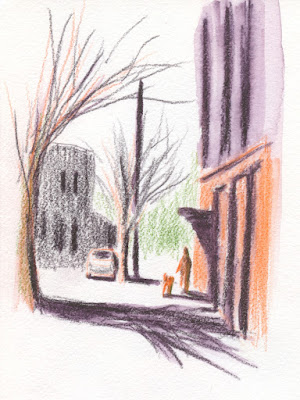 |
| Stabilo Original colored pencils |
My introduction to Stabilo colored pencils was when a thoughtful
pencil friend in Slovenia sent me a handful of vintage Stabilo Schwan pencils several years ago. I’ve acquired a few other examples since then,
including a set of contemporary Stabilo Original (a gift from another
generous pencil friend), which I’m reviewing here.
(On Amazon, I’ve also seen sets of Stabilo Original under Stabilo’s “Arty+” line. Images of the pencils look the same as the ones I have, so I assume it’s just a branding change on the packaging.)
 |
| Vintage Stabilo Schwan end caps |
I’ve seen the Originals packaged in both tins and cardboard boxes, but my friend gave them to me in a pencil roll, which makes it easy to photograph the Originals’ best angle (below) – the charming end caps! Although the German “Schwan” name no longer appears on the barrel, Stabilo’s white swan icon remains nearly unchanged from the vintage specimens I have (right). I like the salute to its heritage.
 |
| The same swan icon on the Original end caps |
As for the 2.5mm cores, they are among the hardest colored pencils I own. (My recent post of right-handed sketches shows what happens when I try to use such hard pencils with my weakling hand!) Interestingly, just as I found with the vintage Stabilo, the Originals have decent pigment, so even though they are hard, most colors apply with good coverage. It was surprising, however, to find that black (shown in my swatch chart below in the lower-left corner) is extremely pale.
 |
| Stabilo Original swatches made in Stillman & Birn Epsilon sketchbook |
In fact, in my test portrait using a Zorn palette (black, red and ochre), I had so much difficulty drawing the all-important eyes with black that I finally brought in a black Faber-Castell Polychromos for assistance. It almost seems defective because it’s so different from the other colors.
 |
| 4/18/23 Stabilo Original colored pencils in Field Notes Streetscapes sketchbook (Earthsworld reference photo) |
I’m not sure if these pencils are considered artist quality, but the barrels do indicate lightfast ratings.
 |
| Lightfast ratings on the hexagonal barrels |
 |
| Water-soluble! |
Another curiosity about the Originals is that although they are not billed as water-soluble, they are, in fact, at least slightly water-soluble. Stabilo also makes a corresponding water-soluble Aquacolor line, so it’s strange that the Originals would show this much solubility. (One of these days, I’ll review the Aquacolors and compare their water-solubility to that of the Originals.)
Other than for making fine details, I’m not a fan of drawing with such hard colored pencils. However, because Originals have decent pigment while also being hard, they would be ideal for writing. I would add them to my list of colored pencils hard enough to write with (where the vintage Stabilo is already one of my favorites for this task).
Speaking of writing with colored pencils, as an editor and writer for decades, I recall only a few early years when I marked up text with an analog pencil, and it was plain graphite at that. If I had had the colored pencil collection then that I have now, surely I would have packed a few of these Originals to work. Imagine the flair of using the lovely magenta to cross out trite phrases! Or the marine blue to gently add a comma. Sigh. I worked during the wrong era.
And still speaking of writing with colored pencils, did you see the Oscar-nominated film Tár? The main character, a conductor, is frequently seen using Blackwing pencils and a red/blue Caran d’Ache bicolor pencil to notate musical scores. (I didn’t actually see a Cd’A logo on the bicolor, but seeing other Caran d’Ache products convinced me that the red/blue was likely a Caran d’Ache, too.) A Caran d’Ache Sharpening Machine was also visible on her desk. During one scene, the Cate Blanchett character reaches into a cabinet filled with boxes of Blackwings!
 |
| Cameo appearance by Caran d'Ache bicolor and Blackwing pencils. |
The scene that caused me to leap out of my chair (don’t worry – we were streaming at home, not in a theater) and pause the film showed her selecting a red colored pencil from a tray of more (mostly red) pencils: It was clearly a contemporary Caran d’Ache Pablo pencil – and yet it had a dark end cap! Whaaat??! Pablo pencils have no such end cap! If it was meant to be Caran d’Ache product placement, why would its appearance be altered? Or if it’s an actual Pablo pencil with a different barrel design, why don’t I know about it??!
 |
| A Pablo with a dark end cap??! |
These questions seared my mind for the rest of the over-long movie because, unfortunately, seeing pencils was the highlight of the film. Very disappointed, I resented paying $4.99 for the Amazon Prime viewing. Well, maybe seeing all those pencils made it worth a dollar, but no more than that.









































